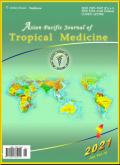Association between the Lung Immune Prognostic Index and mortality in patients with idiopathic inflammatory myopathy-associated interstitial lung disease
IF 1.6
4区 医学
Q3 PUBLIC, ENVIRONMENTAL & OCCUPATIONAL HEALTH
引用次数: 0
Abstract
Objective: To explore the association between the Lung Immune Prognostic Index (LIPI) and 1-year all-cause mortality in patients with idiopathic inflammatory myopathy related interstitial lung disease (IIM-ILD). Methods: Patients who were diagnosed with IIM-ILD at West China Hospital, Sichuan University from January 2008 to December 2021 were retrospectively included and categorized into three groups based on LIPI. Univariable and multivariable Cox proportional hazards models were conducted to explore potential association between the LIPI and patients' mortality. Results: A total of 1116 patients were screened, and 830 were included in this study. The multivariable Cox analysis showed that, compared with patients with poor LIPI, the hazard ratio (HR) for all-cause 1-year mortality was 0.22 (95% CI 0.05-0.93, P=0.04) for patients in the good LIPI group (LDH<250 IU/L and dNLR<3). After excluding patients lost to follow-up within one year, a similar result was found for LIPI (HR 0.20, 95% CI 0.05-0.86; P=0.03). Conclusions: Good LIPI was independently associated with decreased risk of all-cause 1-year mortality in patients with IIM-ILD. This easy-to-obtain index might be served as a potential marker for assessing the prognosis of IIM-ILD.肺免疫预后指数与特发性炎症性肌病相关间质性肺病患者死亡率之间的关系
目的探讨特发性炎症性肌病相关间质性肺病(IIM-ILD)患者的肺免疫预后指数(LIPI)与1年全因死亡率之间的关系。研究方法回顾性纳入2008年1月至2021年12月在四川大学华西医院确诊的特发性炎症性肌病相关间质性肺病(IIM-ILD)患者,并根据LIPI分为三组。采用单变量和多变量Cox比例危险模型探讨LIPI与患者死亡率之间的潜在关系。结果本研究共筛选出 1116 名患者,其中 830 人被纳入研究。多变量 Cox 分析显示,与 LIPI 较差的患者相比,LIPI 较好组患者(LDH<250 IU/L,dNLR<3)1 年全因死亡率的危险比(HR)为 0.22(95% CI 0.05-0.93,P=0.04)。在排除一年内失去随访的患者后,发现 LIPI 也有类似的结果(HR 0.20,95% CI 0.05-0.86;P=0.03)。结论良好的LIPI与IIM-ILD患者1年内全因死亡风险的降低密切相关。这一易于获得的指标可作为评估 IIM-ILD 预后的潜在标志物。
本文章由计算机程序翻译,如有差异,请以英文原文为准。
求助全文
约1分钟内获得全文
求助全文
来源期刊

Asian Pacific journal of tropical medicine
PUBLIC, ENVIRONMENTAL & OCCUPATIONAL HEALTH-TROPICAL MEDICINE
CiteScore
4.00
自引率
9.70%
发文量
1936
审稿时长
3-8 weeks
期刊介绍:
Asian Pacific Journal of Tropical Medicine (ISSN 1995-7645 CODEN: APJTB6), a publication of Editorial office of Hainan Medical University,is a peer-reviewed print + online Monthly journal. The journal''s full text is available online at http://www.apjtm.org/. The journal allows free access (Open Access) to its contents and permits authors to self-archive final accepted version of the articles on any OAI-compliant institutional / subject-based repository.
APJTM aims to provide an academic communicating platform for international physicians, medical scientists, allied health scientists and public health workers, especially those of the Asia-Pacific region and worldwide on tropical medicine, infectious diseases and public health, and to meet the growing challenges of understanding, preventing and controlling the dramatic global emergence and re-emergence of infectious diseases in the Asia-Pacific.
The journal is proud to have an international and diverse editorial board that will assist and facilitate the publication of articles that reflect a global view on tropical medicine, infectious diseases and public health, as well as emphasizing our focus on supporting the needs of public health practitioners. The APJTM will allow us to seek opportunities to work with others who share our aim, and to enhance our work through partnership, and to uphold the standards of our profession and contribute to its advancement.
 求助内容:
求助内容: 应助结果提醒方式:
应助结果提醒方式:


